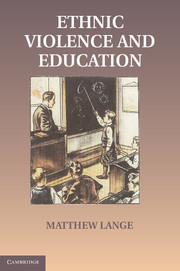Book contents
- Frontmatter
- Contents
- Figures
- Tables
- Acknowledgments
- 1 Introduction
- 2 Education and Ethnic Violence
- 3 Testing the Impact of Education on Ethnic Violence
- 4 Education and Ethnic Violence in Sri Lanka
- 5 Education and Ethnic Violence in Cyprus
- 6 Education and Ethnic Violence in the Palestinian Territories, India, and Sub-Saharan Africa
- 7 Education and Ethno-Nationalist Conflict in Canada and Germany
- 8 Education and Ethnic Violence
- Bibliography
- Index
1 - Introduction
Education and Ethnic Violence
Published online by Cambridge University Press: 05 June 2012
- Frontmatter
- Contents
- Figures
- Tables
- Acknowledgments
- 1 Introduction
- 2 Education and Ethnic Violence
- 3 Testing the Impact of Education on Ethnic Violence
- 4 Education and Ethnic Violence in Sri Lanka
- 5 Education and Ethnic Violence in Cyprus
- 6 Education and Ethnic Violence in the Palestinian Territories, India, and Sub-Saharan Africa
- 7 Education and Ethno-Nationalist Conflict in Canada and Germany
- 8 Education and Ethnic Violence
- Bibliography
- Index
Summary
After the initial shock following the 9/11 attacks, many Americans stopped to consider why a group of young men would choose to take their own lives and kill thousands of innocent people. Whereas some looked in the mirror and focused on American foreign policy and economic dominance as a cause of widespread resentment, most considered the bombers themselves. Among the latter category, many quickly concluded that the bombers were evil and deranged lunatics, quite possibly the devil's underlings who were attempting to destroy God's chosen few. The more sociologically inclined considered how the social environment of the bombers influenced their actions. One explanation was that the bombers were impoverished and acted out of desperation. Another more common explanation was that they were uneducated and acted out of ignorance.
The educational hypothesis seems quite logical, as it coincides with the popular belief that education helps prevent extremism and violence by promoting critical-thinking skills, empathy, and tolerance. Indeed, the educational hypothesis is commonly used to explain diverse types of violence, such as why someone participates in gang violence or beats one's spouse. Along these lines, Nobel Laureate Elie Wiesel proclaimed that “[e]ducation is the way to eliminate terrorism” (Berrebi 2007: 3). Yet, Wiesel is a very educated and erudite man and a former member of Irgun, which Hannah Arendt, Albert Einstein, and other Jewish intellectuals described as “a terrorist, right-wing, chauvinist organization” (Abramowitz et al. 1948). Indeed, in its struggle against Arab Palestinians and the British colonial administration, the Zionist organization helped revolutionize modern “terrorist” techniques, including the bombing of Arab markets and the King David Hotel in 1946, the latter of which killed ninety-one innocent men, women, and children (Walter and Sandler 2006: 250).
- Type
- Chapter
- Information
- Educations in Ethnic ViolenceIdentity, Educational Bubbles, and Resource Mobilization, pp. 1 - 11Publisher: Cambridge University PressPrint publication year: 2011



